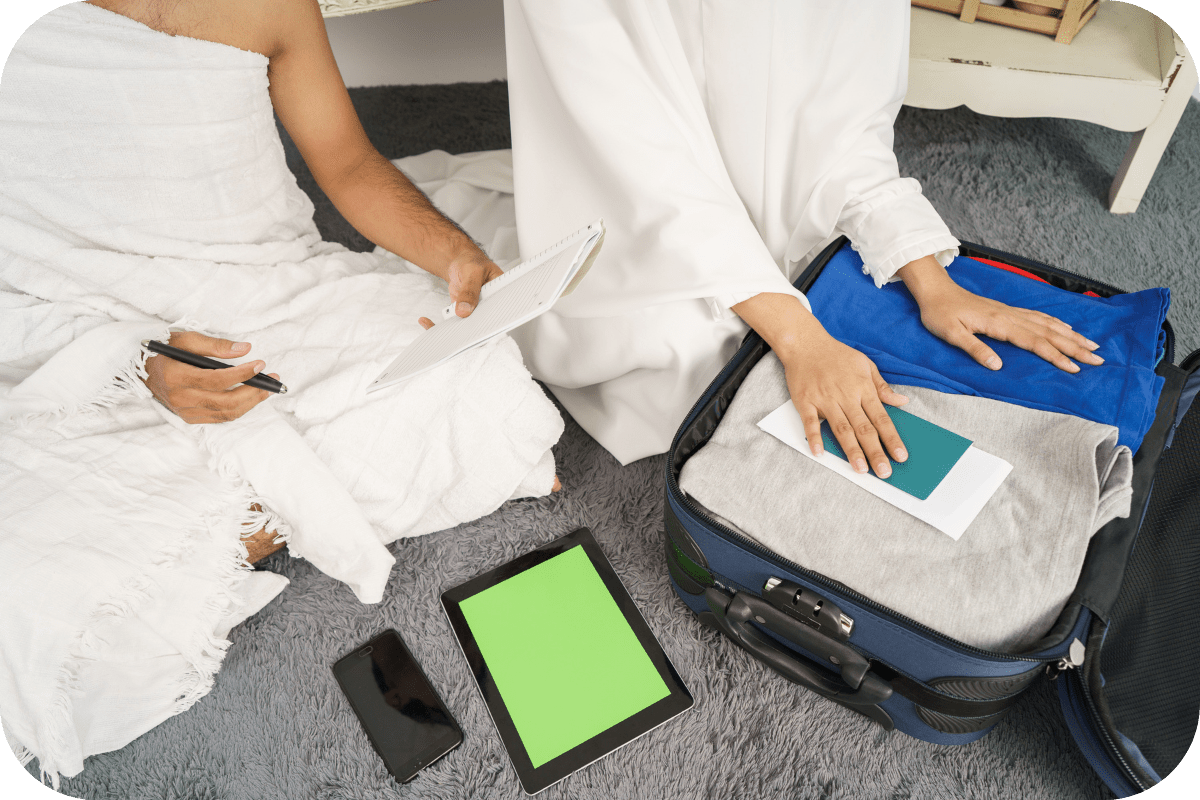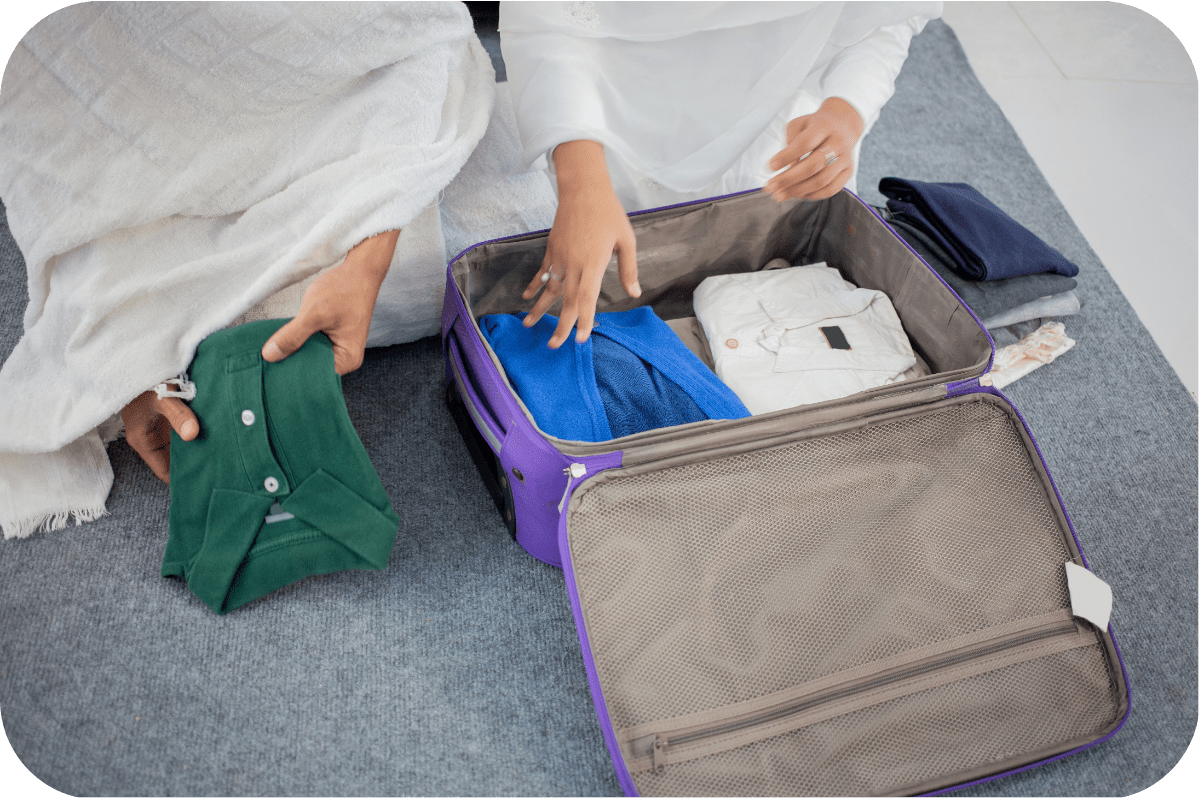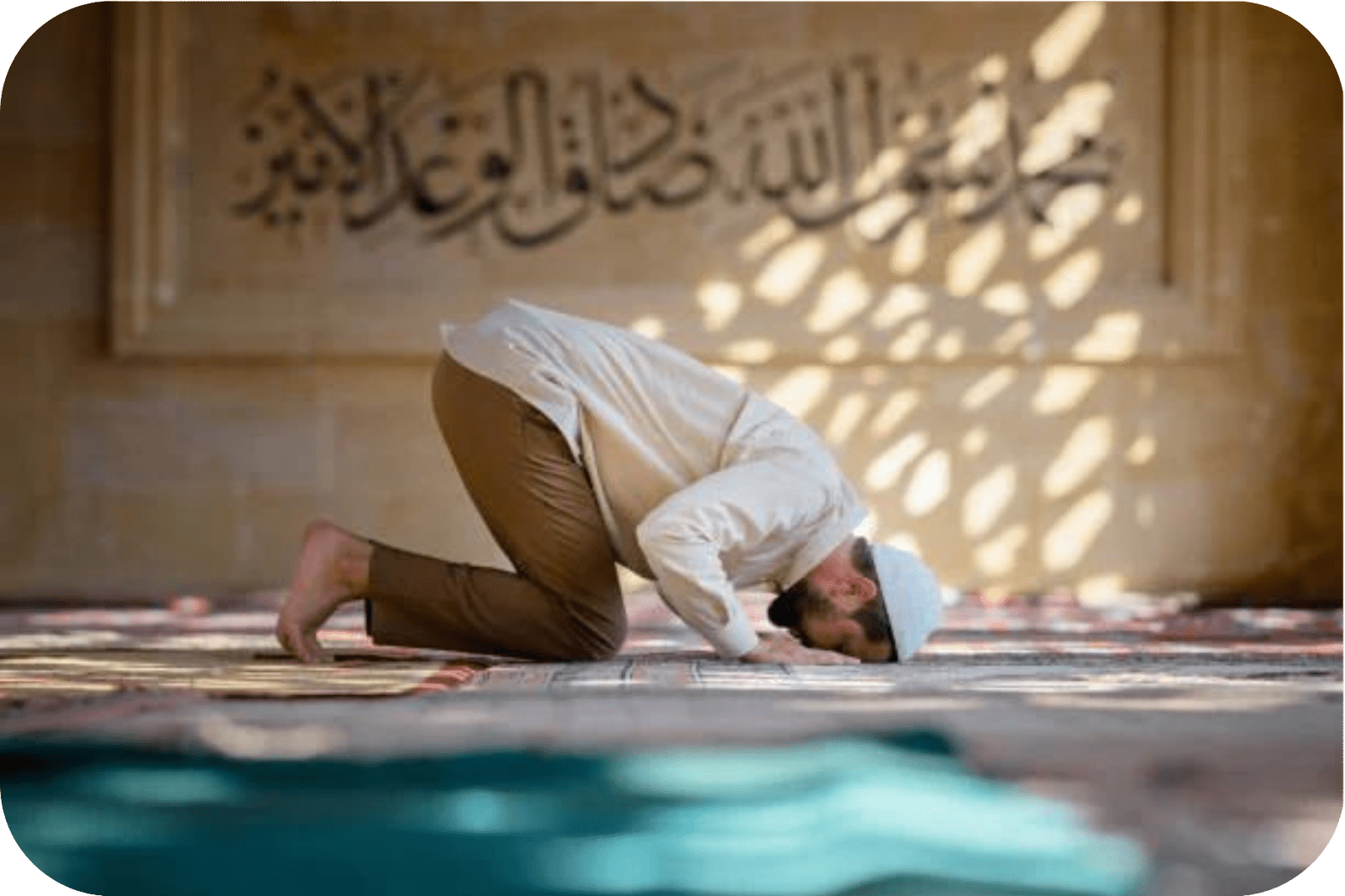Must-Pack Essentials for Umrah: A Comprehensive Guide
Must-Pack Essentials for Umrah: A Comprehensive Guide

Umrah is a deeply spiritual experience for Muslims worldwide. Similar to Hajj, Umrah holds significant importance in Islam, offering pilgrims the opportunity to fulfill their religious duties and strengthen their connection with Allah.
As with any pilgrimage, adequate preparation is essential to ensure a smooth and fulfilling journey. In this guide, we will explore the essential items that every pilgrim should pack for their Umrah journey. From travel documents to personal care items, we'll cover everything you need to make your pilgrimage a memorable and spiritually enriching experience.
Browse our selection of Hajj and Umrah essentials, including abayas, hijabs, and prayer mats. Find everything you need for your journey to Makkah and Madinah.
What Is Umrah?
Umrah, often referred to as the "minor pilgrimage," is a sacred journey undertaken by Muslims to the holy city of Makkah, located in Saudi Arabia. Unlike Hajj, which is required for every able Muslim to perform at least once in their lifetime. Umrah is a non-mandatory pilgrimage that can be performed at any time of the year, and it is considered a shorter and less demanding pilgrimage compared to Hajj.
The Umrah pilgrimage consists of several essential rituals, with each having a spiritual significance, but there are three pillars that make it complete:
Tawaf: Starting from the Black Stone, pilgrims walk seven times around the Kaaba, symbolising their devotion to Allah and unity with fellow Muslims.
Sa'ai: Involves walking between the hills of Safa and Marwah seven times, commemorating the actions of lady Hajar (RA), the wife of Prophet Ibrahim (RA), in search of water.
Halq or Taqsir: Pilgrims (men) complete their Umrah journey by shaving their heads or cutting their hair, signifying spiritual purification and humility before Allah.
How to Prepare for Umrah?
1. Physical Preparation
Preparing physically for Umrah is crucial for a comfortable and successful pilgrimage. Assess your health and fitness level with guidance from your healthcare provider to address any underlying health conditions.
Focus on improving overall physical fitness by incorporating regular exercise, including cardiovascular, strength training, and flexibility exercises. Aim for a balanced workout regimen targeting different muscle groups to enhance endurance and stamina.
Pay attention to diet and nutrition, maintaining a healthy and balanced diet rich in fruits, vegetables, lean proteins, and whole grains. Stay hydrated by drinking plenty of water, especially with increased physical activity.
Practice specific exercises mimicking Umrah movements, such as walking, hiking, and stair climbing, to prepare for the pilgrimage's physical demands.
Prioritize rest and recovery to prevent overexertion and fatigue. Ensure adequate sleep and listen to your body's signals to avoid pushing yourself too hard.
2. Spiritual Preparation
Spiritual preparation is equally important for a meaningful Umrah experience. Begin by purifying your intentions and renewing your commitment to faith and worship. Reflect on the spiritual significance of Umrah and its impact on your spiritual journey.
Engage in regular acts of worship, including prayer, Quran recitation, and supplication, to strengthen your spiritual connection and readiness for Umrah. Seek forgiveness for past sins and strive for spiritual purification and elevation.
Before departing, seek forgiveness for any shortcomings or sins, purifying your heart and mind. Lastly, work on resolving any conflicts between you and others, so your relationships are harmonious and peaceful
Prophet Muhammad (peace be upon him) said:
“It is not permissible for a Muslim to shun a fellow Muslim for more than three days, for they are both in the wrong so long as they are shunning one another. Whichever of them is the first one to seek reconciliation, his taking the initiative will be an expiation for him…
(Saheeh at-Targheeb, 2759)
By engaging in these spiritual preparations, you can embark on your Umrah journey with a cleansed soul and a heightened connection to your faith.
What are the essential items to pack for Umrah?
Now that you’re physically and spiritually ready for this life-changing trip, it’s time to prepare your packing list:
1. Travel Documents and Essentials
![]()
Before embarking on your Umrah journey, ensure you have all necessary travel documents and essentials prepared. These items include:
• Passport: Your passport is the most crucial travel document. Ensure it has at least six months' validity from the date of your planned return.
• Umrah Visa: Obtain your Umrah visa from the Saudi embassy or consulate in your country. The visa application process may require specific documentation, so be sure to check the requirements beforehand.
• Flight Tickets: Book your flight tickets well in advance to secure the best deals and ensure availability during peak travel seasons.
• Hotel Reservations: Make hotel reservations in Makkah and Madinah for the duration of your stay. Choose accommodations close to the Haram to minimize travel time and maximize time spent in prayer and worship.
• Travel Insurance: Consider purchasing travel insurance to protect yourself against unexpected events such as trip cancellations, medical emergencies, or lost baggage.
• Money and Currency Exchange: Bring sufficient funds for your expenses during Umrah. Exchange currency to Saudi Riyals (SAR) before departure or upon arrival in Saudi Arabia. It's advisable to carry a combination of cash and debit/credit cards for convenience.
2. Clothing and Accessories
![]()
When packing for Umrah, it's essential to choose clothing that is modest, comfortable, and appropriate for the pilgrimage. Here are the clothing essentials you'll need:
• Ihram Garments: The Ihram is a set of simple, white garments worn by pilgrims during Umrah. For men, it typically consists of two unstitched white sheets draped around the body—one wrapped around the waist and the other over the shoulders. Women can wear any modest, white clothing that covers their entire body, excluding the face and hands.
• Modest Clothing for Men and Women: In addition to Ihram garments, pack modest clothing suitable for wearing during the rest of your stay in Makkah and Madinah. For men, this may include loose-fitting, long-sleeved shirts and trousers. Women should pack loose-fitting, ankle-length dresses or abayas and headscarves (hijabs) to cover their hair.
• Comfortable Footwear: Choose comfortable footwear that is suitable for walking long distances and standing for extended periods, especially during Tawaf and Sa'i. Opt for closed-toe shoes with good arch support and cushioning to minimize discomfort and prevent blisters.
• Accessories: Don't forget to pack essential accessories such as headscarves (hijabs) for women to cover their hair during prayers and in public areas. Additionally, consider bringing belts to secure Ihram garments and keep them in place during rituals. Other useful accessories may include sunglasses, hats, and umbrellas to protect against the sun's rays.
3. Prayer Essentials
![]()
Prayer is an integral part of the Umrah pilgrimage, and having the right essentials can enhance your spiritual experience. Here are the prayer essentials you'll need to pack:
• Prayer Mat: A portable prayer mat provides a clean and comfortable surface for performing prayers, especially in crowded or outdoor spaces. Choose a lightweight and foldable mat that is easy to carry and store in your luggage.
• Qur'an and Islamic Literature: Bring along a copy of the Qur'an or other Islamic literature to read and reflect upon during your downtime. Consider packing a pocket-sized Qur'an or digital device with electronic copies of religious texts for convenience.
• Prayer Beads: Prayer beads, also known as Misbaha or Tasbih, are commonly used by Muslims to keep track of their recitations of praises (tasbih) and supplications (dua). Choose a set of prayer beads made from durable materials that are easy to handle and carry.
• Dua/Journal: Bring a small notebook or journal to jot down personal reflections, prayers, and supplications throughout your Umrah journey. Use this journal as a tool for self-reflection, spiritual growth, and recording memorable experiences.
• Umrah Guidebook: Pack a comprehensive Umrah guidebook or booklet that outlines the rituals, prayers, and etiquette of Umrah. This guidebook will serve as a valuable reference during your pilgrimage, helping you navigate the various rituals and understand their significance.
• Tasbeeh Counter: A tasbeeh counter, or digital tasbeeh, is a handy device for keeping track of your recitations of praises and supplications. Whether traditional or electronic, a tasbeeh counter helps maintain focus and concentration during prayers and dhikr.
4. Self-Care Items
![]()
Taking care of your personal hygiene and well-being is essential during the Umrah pilgrimage. Here are the self-care items you'll need to pack:
• Moisturizing and Sunscreen Cream: Protect your skin from the harsh sun and dry air by packing moisturizing lotion and sunscreen with a high SPF (sun protection factor). Apply sunscreen generously before heading out and reapply throughout the day to prevent sunburn and skin damage.
• Shaving Machines and Blades: For men, bringing a shaving machine or disposable razors is essential for maintaining Ihram (the state of consecration). Keep your facial hair trimmed and neat according to Islamic guidelines while adhering to the rules of Ihram.
• Toothbrush and Toothpaste: Maintain oral hygiene by packing a toothbrush and toothpaste to brush your teeth regularly, especially after meals and prayers. Opt for travel-sized toothpaste and a compact toothbrush for convenience.
• Face Towels: Pack a few face towels or handkerchiefs to wipe away sweat, refresh your face, and maintain cleanliness throughout the day. Choose lightweight and quick-drying towels that are easy to carry and wash as needed.
• Reusable Water Bottle: Stay hydrated during your Umrah journey by carrying a reusable water bottle with you at all times. Fill up your bottle with clean drinking water whenever possible, especially during outdoor activities and rituals.
• Hair Dryer: While not essential, a compact travel-sized hair dryer can be convenient for drying your hair quickly after performing ablutions or washing your face. Choose a lightweight and portable hair dryer with dual voltage capabilities for international travel.
5. Electronic Devices and Accessories
![]()
Stay connected and capture precious moments during your Umrah pilgrimage by packing the following electronic devices and accessories:
• Mobile Phone and Charger: Keep in touch with your loved ones and access important information by bringing along your mobile phone. Don't forget to pack a charger to keep your phone powered throughout the journey.
• Power Bank: Ensure your devices stay charged on the go by carrying a portable power bank. Opt for a high-capacity power bank that can recharge your phone multiple times, allowing you to stay connected even during long days of sightseeing and rituals.
• Universal Adapter: If you're traveling from a different country, remember to pack a universal adapter to charge your electronic devices. Saudi Arabia uses Type G electrical outlets, so make sure your adapter is compatible with this socket type.
• Camera or Smartphone for Capturing Memories: Preserve the memories of your Umrah pilgrimage by bringing a camera or smartphone with a good quality camera. Capture breathtaking views, sacred sites, and moments of reflection to cherish for years to come.
6. Medical Supplies

Prioritise your health and well-being during your Umrah pilgrimage by packing essential medical supplies:
• Current/Regular Medication: Ensure you have an ample supply of any prescription medications you take regularly. Pack them in their original containers, along with a copy of your prescription, to avoid any issues during travel.
• Flu Medication and Painkillers: Be prepared for common ailments like the flu or headaches by packing over-the-counter medications such as flu medication and painkillers. These can provide relief from symptoms and discomfort while you're away from home.
• Vitamins: Maintain your overall health and immunity by bringing along essential vitamins. Consider packing multivitamins or supplements to support your well-being during the pilgrimage.
• First-Aid Supplies: Pack a basic first-aid kit containing items such as adhesive bandages, antiseptic wipes, gauze pads, and medical tape. These supplies can be helpful for treating minor injuries or ailments that may occur during your journey.
Conclusion
As you embark on your Umrah pilgrimage, thorough preparation is essential to ensure a smooth and spiritually enriching journey. By packing the right essentials and making necessary arrangements beforehand, you can focus on the spiritual significance of Umrah and fully immerse yourself in the experience.
At Riwaya, our mission is to support you every step of the way, providing quality products and resources to enhance your Umrah experience. May your pilgrimage be a transformative experience filled with blessings, forgiveness, and spiritual growth.
Selling at Riwaya
Are you a seller of Islamic products looking to reach a global audience of discerning buyers? Join Riwaya and showcase your offerings to a community of individuals seeking quality items that enrich their spiritual lives.
As a seller on Riwaya, you'll benefit from our platform's visibility and reputation as a trusted marketplace for authentic Islamic goods. Our commitment to quality and customer satisfaction ensures that your products are presented in the best possible light, attracting buyers who value craftsmanship, tradition, and spirituality.
Join Riwaya today and become part of a vibrant community dedicated to promoting Islamic culture and heritage worldwide. Let us help you connect with customers who share your passion for excellence and authenticity in Islamic products.
FAQs
Q1: What is Umrah?
Umrah, often referred to as the "minor pilgrimage," is a sacred journey undertaken by Muslims to the holy city of Makkah, located in Saudi Arabia. It is a spiritual act of worship that involves performing a series of rituals at specific locations in and around the Grand Mosque, known as the Masjid al-Haram.
Q2: What items are needed for Umrah?
Pilgrims require essential items like a valid passport, Umrah visa, flight tickets, hotel reservations, and travel insurance. They should also pack modest clothing, prayer essentials, self-care items, electronics, and medical supplies.
Q3: What clothing is worn for Umrah?
Pilgrims wear Ihram garments—two white sheets for men and modest white attire for women. Additionally, they pack comfortable footwear, headscarves for women, and other modest clothing for their stay.
Q4: What is the Umrah process?
Pilgrims enter Ihram, perform Tawaf (circumambulation of the Kaaba), Sa'i (walking between Safa and Marwa hills), and conclude with Halq or Taqsir (shaving or trimming hair).
Q5: How long does Umrah take?
Umrah duration varies, but the rituals can be completed within a day. Pilgrims often spend additional time in Makkah and Madinah for spiritual activities and sightseeing.
Q6: How is Umrah different from Hajj?
While both Umrah and Hajj are pilgrimages to the holy city of Makkah, they differ in terms of their timing, rituals, and obligations. Hajj is one of the five pillars of Islam and is obligatory for every able Muslim to perform at least once in their lifetime, while Umrah is non-mandatory and can be performed at any time of the year.
Q7: When can Umrah be performed?
Umrah can be performed at any time of the year, unlike Hajj, which has specific dates during the Islamic month of Dhu al-Hijjah. However, certain times, such as the month of Ramadan, are considered more virtuous for performing Umrah due to the increased rewards associated with worship during this blessed month.
Q8: What are the basic requirements for performing Umrah?
The basic requirements for performing Umrah include being a Muslim, being of sound mind and health, and having the financial means to undertake the journey. Additionally, pilgrims must be in a state of ritual purity (wudu) before beginning the rituals of Umrah.
Q9: Can Umrah be performed at any time of the year?
Yes, Umrah can be performed at any time of the year, except during the days of Hajj (specifically the first ten days of Dhu al-Hijjah). Pilgrims have the flexibility to choose the timing of their Umrah journey based on personal preference and convenience.
Q10: What are the main rituals of Umrah?
The main rituals of Umrah include wearing the ihram garments, performing Tawaf (circumambulation) around the Kaaba, performing Sa'i (walking) between the hills of Safa and Marwah, and shaving or trimming the hair to complete the pilgrimage.
Q11: Is Umrah obligatory like Hajj?
No, Umrah is not obligatory like Hajj. While Hajj is one of the five pillars of Islam and is mandatory for every able Muslim to perform once in their lifetime, Umrah is a recommended (but non-mandatory) pilgrimage that can be performed at any time of the year.
Q12: What are the different types of Umrah?
There are two main types of Umrah: Umrah al-Mufradah (independent Umrah) and Umrah al-Tamattu (combined Umrah and Hajj). Umrah al-Mufradah is performed independently of Hajj, while Umrah al-Tamattu is performed in conjunction with the Hajj pilgrimage.



